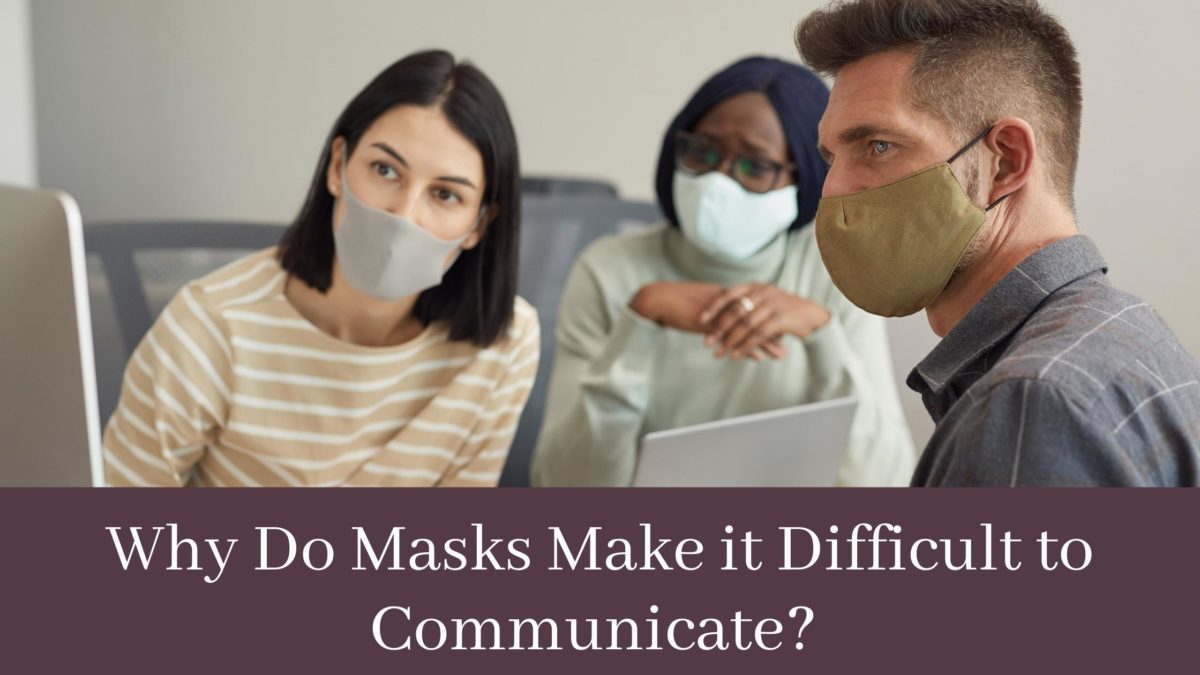The year 2020 witnessed a global shift to wearing personal protective equipment, including facemasks, and that necessary precautionary measure was inconvenient for many reasons. As we know all too well, wearing a facemask can make it feel uncomfortable to breathe, exercise, and talk to others. The effects on our skin and ears add to the discomfort of these necessary protective tools.
When it comes to communication, face masks do have the effect of making the sound of speech quieter, but that’s not the only reason they make conversation difficult. In fact, facemasks get in the way of our multisensory experience of talking with one another. Let’s consider the way this happens, as well as the things you can do to make communication with facemasks easier for you and your community.
Multisensory Communication
When we talk with one another, we aren’t just sending out sonic messages through our voices. Indeed, facemasks lower the decibel level of speech, making it hard to hear simply due to the loss of volume. They also change the frequency spectrum of speech, meaning the types of sound from low to high pitches that we use to communicate. But cutting off many of the high-pitched consonant articulations in our voices, face masks can make some phonemes sound like others.
Beyond these auditory effects, face masks also obscure the visual cues that our bodies give through speech. In a direct way, our eyes perceive the movements of mouths when they speak to add more information to the communication process. We may find ourselves consciously looking at mouths to help clarify meaning, or we might do so unconsciously through peripheral vision. In addition to watching the way mouths move to form words, we take in information from facial expressions to give words context.
Just like the accent on a word and tone of voice can change its meaning, facial expressions can transform speech from one meaning to another. With these many forms of multisensory communication in mind, face masks do indeed obscure the process of communication on many levels.
Conversation Accommodations
When you find yourself having a conversation with someone while wearing a facemask, it is important to keep accommodations for hearing loss in mind. In some cases, you might know that a person has hearing loss, so you will want to put these tactics into practice. In other cases, you might want to use these accommodation strategies for the strangers you meet who might have undisclosed hearing loss.
First of all, try to raise the volume of your voice to compensate for the loss of volume in conversations with facemasks. When possible, try to use gestures or other visible expressions to make the context of your communication easier to understand. Some people have had success using facemasks with a clear plastic insert. This feature was designed specifically to assist those who need to watch mouth movements to assist conversation, but plastic panels can become fogged up with breath and vapor.
If you are in a place where conversation is particularly difficult, you might want to suggest moving to a quieter place. Public places and stores are some of the more difficult locations for conversation with a facemask, so you might even want to suggest continuing your conversation outdoors where masks can be removed. If you find that these accommodations are not making it possible to converse with a person who has hearing loss, you might want to incorporate a smartphone dictation app into the equation.
In many cases these accommodations will make it possible to convey essential information to others. However, the big picture of communication, including the nuance of turns of phrase, can be lost without more robust assistance. The best way to overcome the challenges of communication with a facemask is to pursue treatment for hearing loss. Beginning with a diagnosis of hearing ability through a test administered by one of our hearing health professionals, you can receive recommendations for the right hearing aids that will make it possible to hear and communicate more easily.
If you have a loved one who is struggling to communicate while wearing a facemask, the best way you can help is to encourage a hearing test and treatment for hearing loss if necessary.

